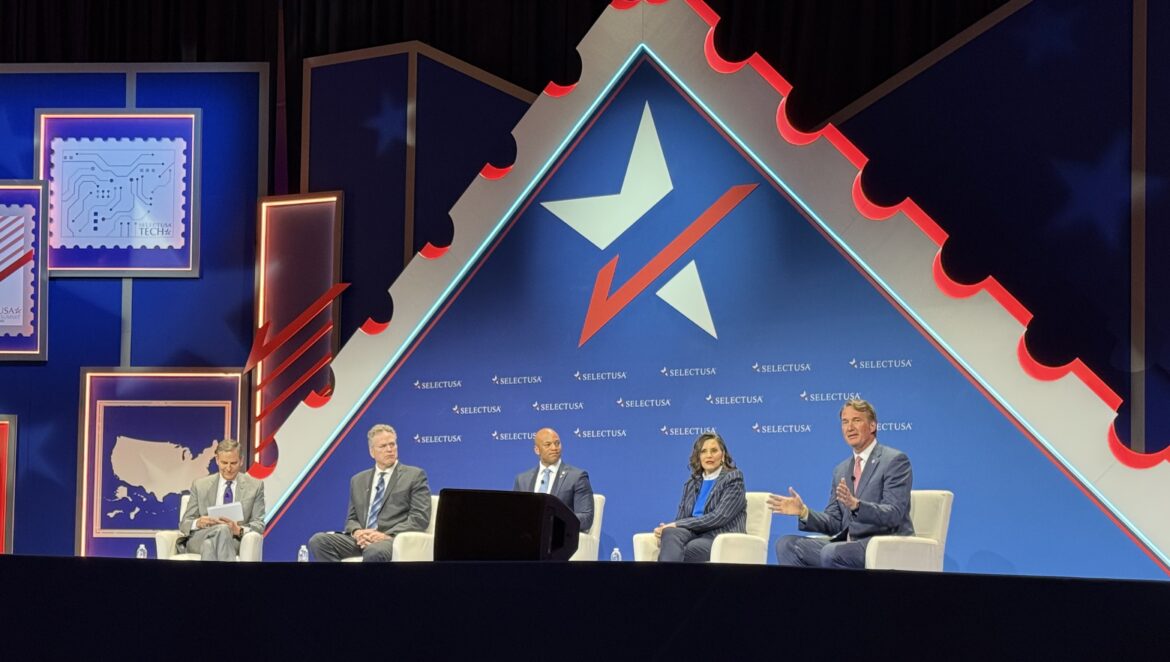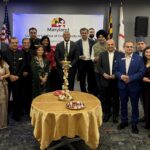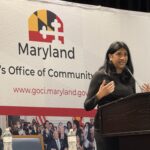Governor Wes Moore of Maryland emphasized his administration’s commitment to fostering inclusive economic growth by making Maryland a national leader in small business development, particularly for diverse communities, including South Asian entrepreneurs.
“Maryland’s working hard to make Maryland the best state in the country for small business growth and making sure that our economic growth is one that is supportive for everybody within the state,” Governor Moore told South Asian Herald on May 12, 2025, at the 2025 SelectUSA Investment Summit in Gaylord National Resort and Convention Center, Maryland.
He added that the state is focused on ensuring all businesses, including South Asian-owned enterprises, receive the support they need.

Before speaking to South Asian Herald, Governor Moore participated in a plenary session on “Governors Investing in American Technological Competitiveness,” at the Summit, which is being held from May 11-14. The session also featured Virginia Governor Glenn Youngkin, Michigan Governor Gretchen Whitmer, and Alaska Governor Mike Dunleavy. The panel, moderated by CEO of National Association of Manufacturers, Jay Timmons, addressed the role of artificial intelligence (AI) and advanced manufacturing in driving economic growth and attracting global investment.
Discussing Maryland’s advancements in AI, Moore said the state is investing in “lighthouse industries” such as life sciences, information technology, and aerospace and defense, with AI playing a significant role under the IT bucket. He highlighted key AI assets in the state, including initiatives at Johns Hopkins data center and AI initiative and the University of Maryland’s AI Center, noting that the university is also positioning itself as a hub for quantum research.
Moore stressed that AI is enhancing not just government operations but also the private sector, higher education institutions, and various investment platforms.
He underscored the importance of being proactive. “So, I just believe strongly that when we’re having these conversations about generative AI, we cannot look at it exclusively from a defensive measure, we do have to look at it from an offensive perspective,” he said, emphasizing the need to involve communities and communicate the long-term benefits of AI.
Governor Glenn Youngkin echoed the significance of AI for economic growth, citing Virginia’s recent recognition by CNBC as the top U.S. state for business. He attributed this to significant investments in infrastructure and clean energy, including a $500 million investment to prepare industrial sites and the development of nuclear and fusion energy projects.

“One of the things that I’m excited about is nuclear, and we’re really planning on being the first state to commercially deploy small modular reactors,” Youngkin said. “We are the first state to be awarded the construction of the first fusion power plants, which is really exciting.”
Youngkin noted that Virginia has reduced more than 70,000 regulations over the past three years to accelerate business permitting and operations, especially in the data center and AI sectors.
“Virginia is the leading state in the world of data centers by a factor of four,” he said. “It’s estimated that 70 percent of the internet traffic of the world goes through Virginia… that gives us a great opportunity to not just lead the nation but lead the world in the advancement of AI. We’ve seen huge investment across the state”
Youngkin concurred with Governor Whitmer, stating, “AI is not just technology, it’s advanced manufacturing.” He added that the core of AI’s application lies in how it enhances efficiency, creates opportunities, and unlocks new capabilities within the manufacturing sector.

He added that AI is transforming advanced manufacturing and attracting over $100 billion in investments from global companies expanding or relocating to Virginia.
Governor Dunleavy mentioned that AI is radically changing everything. It’s causing businesses to become more efficient, which is good. He also shared how AI is improving efficiency in resource-based sectors like oil, gas, mining, and fishing.
“AI is having an impact in government efficiencies as well,” he said. “We are deploying a number of AI approaches… to modernize our government, to make it more efficient, to find out where there may be some waste and opportunities.”
Governor Whitmer spoke about a new AI partnership between the University of Michigan and Los Alamos National Laboratory. The collaboration aims to improve lives and enhance advanced manufacturing through innovation.
She also revealed that Michigan may become the first U.S. state, and possibly the first in North America, to restart a nuclear facility, aligning with its clean energy goals.

Highlighting the broader societal implications of AI, Whitmer said, “We are looking at it from a wide array of avenues to ensure that we don’t just apply AI to make our lives better alone… We are also leading when it comes to developing, to innovate, and what is the next iteration looks like as we see the whole world moving so quickly.”
In a virtual address, President Donald Trump highlighted his administration’s efforts to reduce burdensome regulations, claiming a record number of job-killing rules had been eliminated. He reiterated his directive that for every new regulation introduced, ten existing ones must be removed.
Trump also spoke about a sweeping tax reform package under development in Congress, describing it as the “largest package we’ve ever done.” He said the bill would include historic tax cuts, including the elimination of taxes on tips, overtime pay, and Social Security benefits for seniors.
“So invest now and invest big,” he urged.
Director of the National Economic Council, Kevin Hassett, in his address, praised growing investor interest in the U.S., stating, “There’s never been a better time to invest in America.”
He referenced the President’s State of the Union address, noting “there’s a race to invest in America,” and that the proposed tax bill would introduce one of the lowest corporate tax rates globally.
“We’re going to have a big, beautiful tax bill that is going to have one of the lowest tax rates on Earth for people to invest in America, and we’re going to Let people expense whatever equipment they purchase,” Hassett said quoting President Trump.






